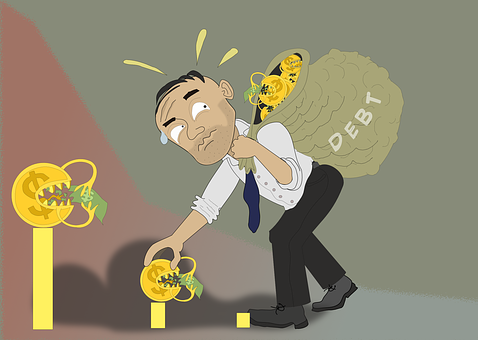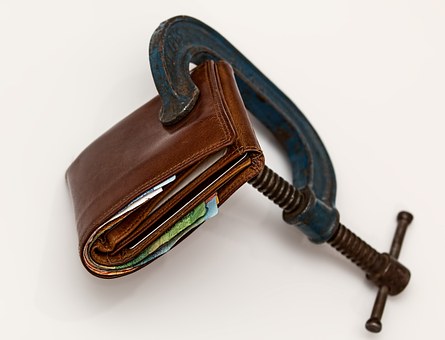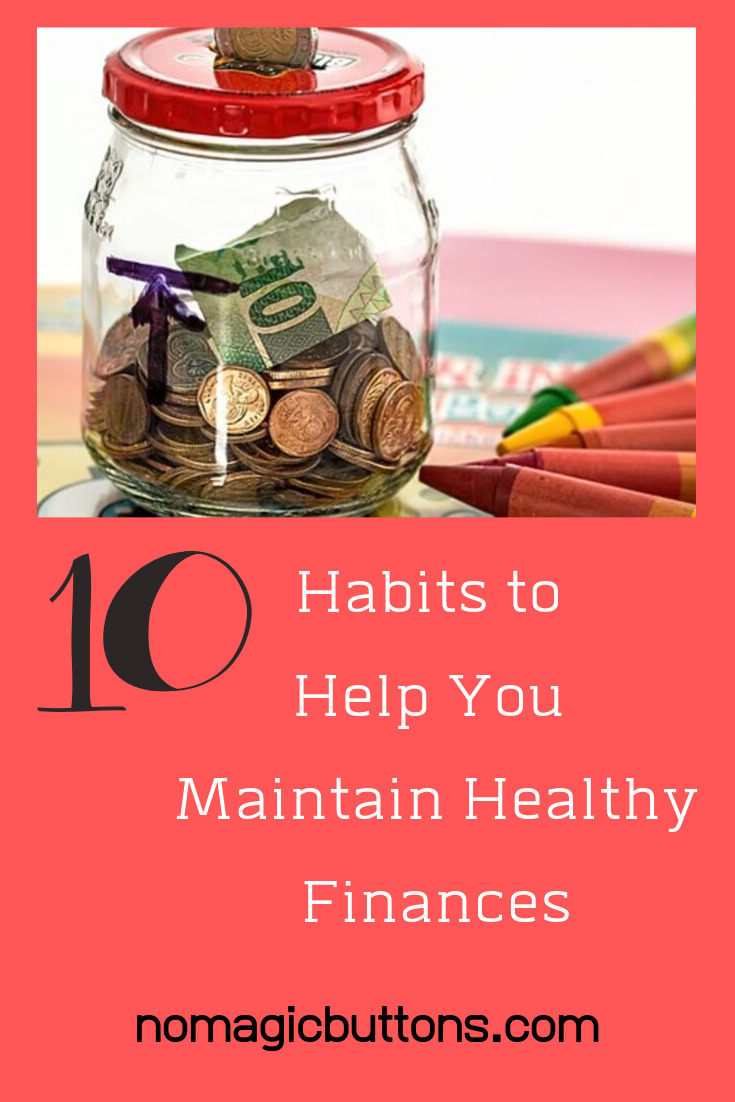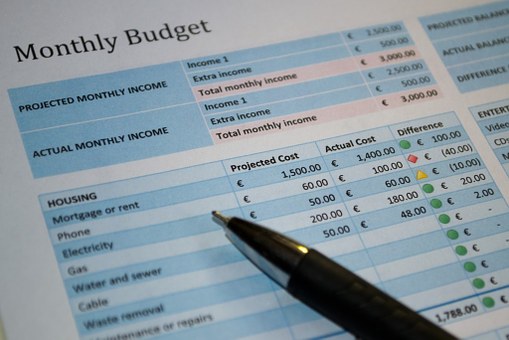Below are ten habits to help you maintain healthy finances. We are all trying to get there. And by all means, I will never claim to be perfect but my husband and I work on these things constantly and have been able to pay off some of our debt and save for vacations. I hope these habits help you too.
Habit #1 – Set up a Budget
You need to have a budget. I have told my adult children for years to keep a budget. It doesn’t matter how little or how much money you make in life you always need to keep track of what is coming in and what is going out. Undoubtedly, this is the most fundamental step of any financial planning and controlling. Tracking income is not as complicated as tracking expenses, especially if the sources of income are not many. Tracking your expenses requires some discipline and consistency in your daily habits such as recording the amount of cash you spent, keeping up with the credit card bills you’ve paid, keeping receipts of other expenses, loan information, tax records, and online purchases.
Having a budget and keeping track of your expenses gives you a better idea of your personal finances and how it can help you to achieve your goals while reminding you to stay financially healthy by not spending more than you bring in.
Habit #2 – Make Priority Purchases
While it is the most basic thing to suggest that you should plan your budget there are certain things which you should prioritize your finances. When you receive your paycheck in the middle of the month and/or at the end of the month, the first step should always be to allocate your funds to the priorities that align with your goals.
Such priority funds maybe your savings, loans, your children’s education, retirement funds, and investments. By setting this as the first step of your budget, you can work out how much you have left to spend or to prepare for other necessities.
Habit #3 – Always Have an Emergency Fund
Other than insurances which can cover a certain amount of your losses in accidents, you are advised to keep up to 10% of your monthly income for emergency uses. For instance, having an accident that can keep you away from work means you can utilize these funds which you have already saved up before for your daily expenses. As surprise scenarios can be quite unpredictable, it is best to prepare the umbrella before the rain. My husband and I are still working on this habit but we do pretty well most of the time.
Habit #4 – Stay Away from High-Interest Credit or Loans
At some point in your life, it would be almost impossible to stay free of loans. Because of this, you must consider the loans with the lowest interest rates that you can apply to reduce your payments. After all, any interest rate imposed on the principal is the main income of the debtor. Paying way more than what you have borrowed will only increase unnecessary expenses.
Some creditors allow advanced repayments for people to finish the repayment before the planned payment period. In this case, you may even save up on the interest of the remaining payment period. Avoid high-interest credit cards also. If you find yourself in need of a credit card at some point research credit cards with lower interest rates to keep your payments low and to also help in paying the credit card off as soon as possible. This is something that we still struggle with and know to advise others to just stay away from them if you can.
Staying debt-free means gaining more income and a better credit score which serves to be an indicator of your healthy financial status to creditors. Healthy credit scores also allow you to obtain loans more easily in the future should you need them. The ideal option would be to stay debt-free, but if you do need a loan, try shopping for the lowest possible interest rates.

Habit #5 – Create a Shopping List to Avoid Impulsive Shopping
Buying on an impulse usually means unnecessary spending which reduces the flexibility of controlling your expenses. It also means reducing the funds necessary to spend on items you may need. You should not purchase any luxury items when you do not have extra cash. Avoid the temptation to splurge on extra items until you can afford them comfortably. Even if you want to splurge it would usually be the money left in your monthly budget after all your financial priorities are settled.
To control impulsive shopping, it is best to get in the habit of making a list of items you need to buy so you will not be as tempted to purchase the items that are not on your list and unnecessary. Similar to long-term and short-term goals that you have set, you can always save up for those luxury items, which you can purchase later.
Habit #6 – Purchasing Value When You Shop
Not all products are better simply because they are more expensive. The prices of such products are down to a multitude of factors such as competition, consumer perception, quality of materials, cost of methods, etc. You should try to do research and read reviews from experts and other consumers before comparing these products to one another and deciding which gives you the best value for your money.
You should always try to make your purchases based on the value of your money. Be specific. Sometimes it is better to pay a bit more for products that will effectively last longer than buying the cheap ones which we must constantly replace or repair. Doing some research and reading a few reviews can pay off in the long run.

Habit #7 – Make Investments
Only allocating monthly income for certain investments does not guarantee profit and therefore, every wise investor has plans for timely exits from their investments to avoid losses. In other words, you need to do your research and possess enough knowledge and the right information to invest in any of the various financial instruments. Otherwise, you could suffer losses without being able to understand the reasons. Make investments but do wisely.
On the other hand, you should monitor your investment funds to avoid losses as well as to seize fine opportunities to gain more profit from your investments. An even more secure way of preventing losses in your investments would be to have an exit strategy especially when you can foresee the circumstances.
Habit #8 – Retirement Funds
Even if governments enforce laws for the employees and the working citizens to allocate retirement funds, sometimes, it would not be enough to live comfortably particularly if you wish to retire at an earlier age. Besides, what good does it do for us if we have prepared the funds for our children to graduate from university or college if we end up in poor financial status when we retire?
Having a retirement plan is a long-term goal which determines how we would like to live our lives when we retire. On the contrary, struggling to have such financial ability at retirement age means you must delay retirement work for a few more years. My husband and I got a late start to saving in our retirement funds and if that is one thing we could go back and change, we would. If you are young and you can only put a small amount into a retirement fund, then my best advice is to just do it. A small amount is better than nothing and can grow over time. As time passes you may be able to put more into your retirement fund.
A really good book to read on this subject is Jill Schlesinger’s “The Dumb Things Smart People Do with Their Money: Thirteen Ways to Right Your Financial Wrongs.” She covers the importance of saving for retirement and does a great job of helping you understand that and other financial matters. I thoroughly enjoyed her book.
Habit #9 – Consistent Raises
Get in the habit of giving yourself a raise. By that I mean if you get a raise at work or through your business use this time to put more into savings. Don’t make the mistake that many of us do and use that raise to go out and buy something you don’t really need. If you receive a raise of 10% and you make $5,000 per month then try to add part of that extra income to your savings and investments toward your future.
In the case where your expenses are not increased in comparison with your income, extra income means more flexibility.

Habit #10 – Analyze Your Financial Condition and Adjust the Budget
With all the necessary steps taken to manage your financial status, don’t overlook the review of your financial performance on a normal basis. Reviewing your financial status needs to be a routine thing that you do, whether it is done monthly or annually.
You need to be aware of changes that have taken place over a specific period and adjust accordingly. No one likes surprises, so make it a habit to review your finances and make those adjustments. Doing this will help you to achieve your financial goals.
Other great resources to help you financially is Dave Ramsey’s “The Total Money Makeover Set” which comes with a workbook to help you stay focused. If you are ready to pay off debt and have financial peace this is a great program to follow.
Good Luck with your financial goals!
Pamela





Very good advice. I am working on your ideas.
Thank you Carolyn. We are still working it on ourselves.